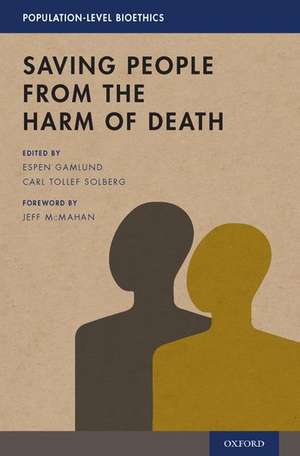Saving People from the Harm of Death: Population-Level Bioethics
Editat de Espen Gamlund, Carl Tollef Solberg Cuvânt înainte de Jeff McMahanen Limba Engleză Hardback – 21 mar 2019
Preț: 499.46 lei
Preț vechi: 680.75 lei
-27% Nou
Puncte Express: 749
Preț estimativ în valută:
95.57€ • 100.05$ • 79.08£
95.57€ • 100.05$ • 79.08£
Carte tipărită la comandă
Livrare economică 25-31 martie
Preluare comenzi: 021 569.72.76
Specificații
ISBN-13: 9780190921415
ISBN-10: 0190921412
Pagini: 304
Dimensiuni: 239 x 157 x 33 mm
Greutate: 0.54 kg
Editura: Oxford University Press
Colecția OUP USA
Seria Population-Level Bioethics
Locul publicării:New York, United States
ISBN-10: 0190921412
Pagini: 304
Dimensiuni: 239 x 157 x 33 mm
Greutate: 0.54 kg
Editura: Oxford University Press
Colecția OUP USA
Seria Population-Level Bioethics
Locul publicării:New York, United States
Recenzii
This remarkable collection of essays sets for itself — and achieves — the rare goal of bringing together philosophers, medical doctors and health economists to have an important dialogue about the harm of death.
The questions raised [in this book] are both important and universal.
Questions about the evaluation of death, in other words, have so far...remained in the theoretical (mostly philosophical) domain and [have] lost sight of the answers to these questions [that] have very serious and far-reaching consequences in everyday life. The collection in front of us is an attempt correcting that omission. As its editors note in the introduction, the goal is to "challenge philosophers, physicians, and health economists to address several neglected and unresolved issues at the intersection of the harmfulness of death and health policy "(p. 5).
It is a collection of high-quality papers, many of which should be of interest to anyone working on the philosophy of death, and of particular interest to ethicists with a focus on the beginning or the end of life.
The questions raised [in this book] are both important and universal.
Questions about the evaluation of death, in other words, have so far...remained in the theoretical (mostly philosophical) domain and [have] lost sight of the answers to these questions [that] have very serious and far-reaching consequences in everyday life. The collection in front of us is an attempt correcting that omission. As its editors note in the introduction, the goal is to "challenge philosophers, physicians, and health economists to address several neglected and unresolved issues at the intersection of the harmfulness of death and health policy "(p. 5).
It is a collection of high-quality papers, many of which should be of interest to anyone working on the philosophy of death, and of particular interest to ethicists with a focus on the beginning or the end of life.
Notă biografică
Espen Gamlund is professor of philosophy at the University of Bergen, Norway. He specializes in moral philosophy and bioethics, and has published work on forgiveness, moral status of animals, death, and resource allocation in health. In addition, he has published on the philosophy of Baruch Spinoza. Gamlund also runs a philosophy blog (in Norwegian), and in 2015 he won The Faculty of Humanities' prize for his research dissemination. Carl Tollef Solberg is a philosopher and medical doctor at the University of Bergen and the University of Oslo. He specializes in bioethics and medical ethics and has published work on priority setting in health care, death, and medical ethics. Further, he has worked at several clinical levels of the health care system. His research interests stand at the intersection of medicine and philosophy.




